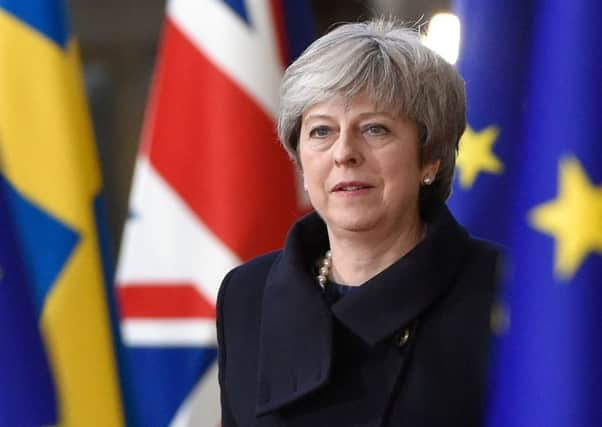Paris Gourtsoyannis: Brexit risks being lost in translation


For decades, Brexiteers could only dream. The gleaming spires of ‘Global Britain’, a beacon for international trade, towered only in their minds.
Well, the planning permission has come through. Now they need to get building.
Advertisement
Hide AdAdvertisement
Hide AdNext year sees the most important trade negotiations in modern British history. They will also be the country’s first in over 50 years.
Like coming out of retirement for a World Cup final, the stakes couldn’t be much higher: whatever the outcome of talks with the EU, the relationship with its biggest trading partner will shape the UK’s future.
Within two years, by the end of any post-Brexit transition phase, the UK will also need to strike new deals in Latin America and Asia to deliver on the promise of Brexit. Painstaking work will be required to build up ties with likes of Brazil, India and China.
In any new relationship, it helps if you can understand each other. Yet the evidence from the first phase of talks with our existing partners in Europe suggests much has been lost in translation. Even now, after all the concessions and blind alleys of the past 18 months, Brexiteers in the Cabinet like Boris Johnson are arguing for a tariff-free, barrier-free trade deal outside the single market, which the EU has repeatedly ruled out. Bizarrely, this is also official Labour policy.
Why hasn’t the message gotten through? For one thing, we haven’t been listening, and even if we had, we probably wouldn’t understand.
For a country that once ran a global empire, the UK’s language skills are worryingly depleted. The number of universities offering language courses is down by 30 per cent since 2000. In England and Wales, French and German A-level entries have fallen by a third in 20 years.
In Scotland, the picture is scarcely better despite the Holyrood Government’s ambition for pupils to leave school with two additional languages. Between 2014 and 2016 at National 5 level, entries for French have fallen by at least a quarter, while German is flat. In all of Scotland in 2016, 99 pupils took Mandarin at Higher level.
Inability to converse breeds an unwillingness to engage and understand, and makes cultural barriers harder to overcome. British students were half as likely as counterparts in France, Germany or Spain to take part in the Erasmus transfer programme in 2012-13. I’ve heard stories of senior diplomats and ambassadors assigned to sensitive posts requiring crash courses in the local language. The Herald’s Davis Leask reported last year on how the Ministry of Defence has fewer than 500 military linguists at its disposal.
Advertisement
Hide AdAdvertisement
Hide AdA lack of skills and an insular mentality means Britain’s political establishment consumes little European media and digests only what it can understand – the bits that are in English.
As a result, domestic political debates in Europe are rarely heard in the UK. A leaked account of a dinner between Jean-Claude Juncker and Theresa May only made waves after parts of it were translated and posted on Twitter by the Economist’s Berlin correspondent. In the words of the former Number 10 press officer Matthew O’Toole, it is a “basic imbalance” that “everybody speaks and reads English in Brussels and [European] capitals” while in London, people who can translate old German newspaper reports “are treated like Jedi”. The French president’s English is so good he can troll political opponents in Washington and London in his own words, live to camera. EU leaders leaving late-night summit dinners can give their own pithy put-downs in English, ready for the 10 o’clock news.
Brexit has been described as the UK’s biggest crisis since Suez, but at least Anthony Eden could speak Arabic. When the people around the EU summit table cease to be our partners and become our adversaries in a negotiation, it puts the UK at a huge disadvantage.
Government ministers seem to either not know or care that every time they write a letter to the Daily Telegraph or give evidence to a parliamentary committee, Brussels is paying attention. By suggesting on the Andrew Marr Show that the phase one agreement wasn’t legally enforceable, David Davis single-handedly guaranteed a toughening of the EU’s stance.
After Brexit, when the UK has to strike its own trade deals around the world, the lack of language skills will only get more damaging. The UK has signed up to ‘full alignment’ with a set of rules that could soon be handed down in another language. French is likely to re-emerge as the EU’s lingua franca, while English could be dropped as an official language altogether.
It isn’t just a problem for politicians; businesses who hire native speakers in the language of target export markets report significant uplifts in sales. So if Brexiteers were serious about building Global Britain, banishing the UK’s monoglot complacency would be a priority – even though it’s probably too late.
But we haven’t heard demands to boost the number of Mandarin, Hindi or Arabic speakers. Demands for more young people to study French and German are even less likely – we’re leaving all that behind, right? As with much to do with Brexit, the problem is that the foundations of Global Britain are built on nostalgia. Too many Brexiteers believe in the ‘Anglosphere’, a circle of friendly former colonies that will gratefully welcome back Britain as their foremost ally, and require no translation.
Putting aside the fact they now have close ties with Europe or emerging powers, their governments either don’t believe in free trade - the United States – or their economies are too distant or too small to replace the scale and depth of the European single market. If you think the answer to Brexit is trade with Australia, New Zealand and Canada, then you’ve misunderstood the question.
Lack of understanding helped lead to Brexit. Its legacy could be lost in translation, too.
